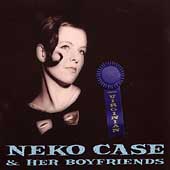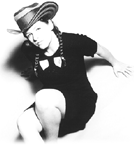
Neko Case and Her Boyfriends, The Virginian, Bloodshot 028.
A Review
by Renee Dechert
It’s too bad Country Music Television won’t be playing Neko Case’s video for “Timber,” the lead track on The Virginian, any time soon. You see, the network has declared the piece, which features an angry Case trashing a bar with, alternately, a guitar, a baseball bat, and a golf club when disinterested patrons ignore her playing, “too violent and cutting edge.” Apparently, CMT, like the rest of the Nashville establishment, prefers to stay with their usual well dressed divas, Reba, Shania, and Trisha, who sing monotonously similar songs of generic empowerment. Such an oversight is unfortunate, for Neko Case is one of the most compelling and powerful voices to emerge in country music in recent years.
 Case first made her musical mark as a drummer in Vancouver’s all-girl punk trio MAOW before persuading their label, Mint, to allow her to do a country album. The Virginian is the result, a savvy blend of traditional country aesthetics and punk anger. With the help of her “Boyfriends,” 13 male and female players, Case’s voice is showcased as she does a traditional country album with enough postmodern twists to revise country standards and themes.
Case first made her musical mark as a drummer in Vancouver’s all-girl punk trio MAOW before persuading their label, Mint, to allow her to do a country album. The Virginian is the result, a savvy blend of traditional country aesthetics and punk anger. With the help of her “Boyfriends,” 13 male and female players, Case’s voice is showcased as she does a traditional country album with enough postmodern twists to revise country standards and themes.
The overall sound of the disc is decidedly honky tonk, with its emphasis on steel guitar and upbeat dance numbers that made juke joints so popular--though there are enough torchy ballads to balance things out. Case’s appropriation of this milieu places The Virginian in an interesting light since the honky tonks , as portrayed in country music culture, were predominately masculine environments where men gathered to escape the routine of their lives. Women who frequented such places, the legendary “honky tonk angels,” were generally portrayed as less-than-virtuous. Case, however, whose voice has the directness of Loretta Lynn’s, the power of Wanda Jackson’s, and the anger of Joan Jett’s, questions all this. Case’s singing and punk attitude allow her to make a place for herself in the honky-tonk tradition as aggressively as she does with her guitar in the “Timber” video.
 While in interviews, Case points to her long love of country music, which she describes as “the eloquent, passionate voice of poor and rural people right alongside blues and jazz,” her punk history also emerges. Punk has always been about questioning authority and breaking down barriers; Neko Case simply applies this ideology to a new genre. While “Timber” may be about a woman whose lover has left her, effectively cutting down the “tree” that is their relationship, she is careful to add, “And if I had my way, you would be planted / drowning in the shade of me.” Case’s voice is powerful on this track, undercutting her role as victim. Indeed, what makes Case’s approach compelling is how at odds her voice is with the material she’s singing. The speakers
in “Lonely Old Lies” and “Jettison” may be victims--a traditional role assumed by women country singers--but Case’s voice, always strong and energetic, belies this, calling attention to the resilience of women and the female voice. As the speaker in “High on Cruel” callously tells an unfaithful lover, “You’ll drown in the light and burn like a star / Your tears are gonna give me fuel.”
While in interviews, Case points to her long love of country music, which she describes as “the eloquent, passionate voice of poor and rural people right alongside blues and jazz,” her punk history also emerges. Punk has always been about questioning authority and breaking down barriers; Neko Case simply applies this ideology to a new genre. While “Timber” may be about a woman whose lover has left her, effectively cutting down the “tree” that is their relationship, she is careful to add, “And if I had my way, you would be planted / drowning in the shade of me.” Case’s voice is powerful on this track, undercutting her role as victim. Indeed, what makes Case’s approach compelling is how at odds her voice is with the material she’s singing. The speakers
in “Lonely Old Lies” and “Jettison” may be victims--a traditional role assumed by women country singers--but Case’s voice, always strong and energetic, belies this, calling attention to the resilience of women and the female voice. As the speaker in “High on Cruel” callously tells an unfaithful lover, “You’ll drown in the light and burn like a star / Your tears are gonna give me fuel.”
Case’s “punktry-western” approach is truly parodic as she does an equal number of original material and covers--songs made famous by players such as the Everley Brothers (“Bowling Green”), Loretta Lynn (“Somebody Led Me Away”), and Ernest Tubbs (“Thanks a Lot”), not to mention a twangy treatment of Queen’s “Misfire,” which closes the disc. Moreover, Case, à la k.d. lang, is unafraid to take on gender issues in a genre known for its rigid gender roles. Where most artists are careful to use the "appropriate" male/female pronoun, Case is less concerned--a point reflected in her “Boyfriends.” Although “Honky Tonk Hiccups” (by Matt Murphy) is a rowdy number where the speaker explains that the only cure for her terminal hiccuping is “a hardwood floor,” the fact that her sweetheart, also a woman, accompanies her is a significant revision of the traditional aesthetic. Case takes a similar approach in “Duchess” (by Scott Engel) and her own “Karoline.”
The title track of The Virginian is the slow story of a young woman “who wouldn’t love God as a test,” thus becoming “free to do what she wanted.” While the song’s narrative follows her life, where “passion was her Sunday best,” it ends with her funeral. As she’s buried, her spirit flies away, and the singer explains, “The sun shown so bright on that day / You’d thought it was spring.” Just as this “Virginian” played by her own rules and found satisfaction, so, on this outstanding disc, does Neko Case.
For information on subscriptions or submissions, visit the journal's website,
or email Editor Gary Burns; for review information, email Reviews Editor George Lewis.
Neko Case Sites
Return to AMP